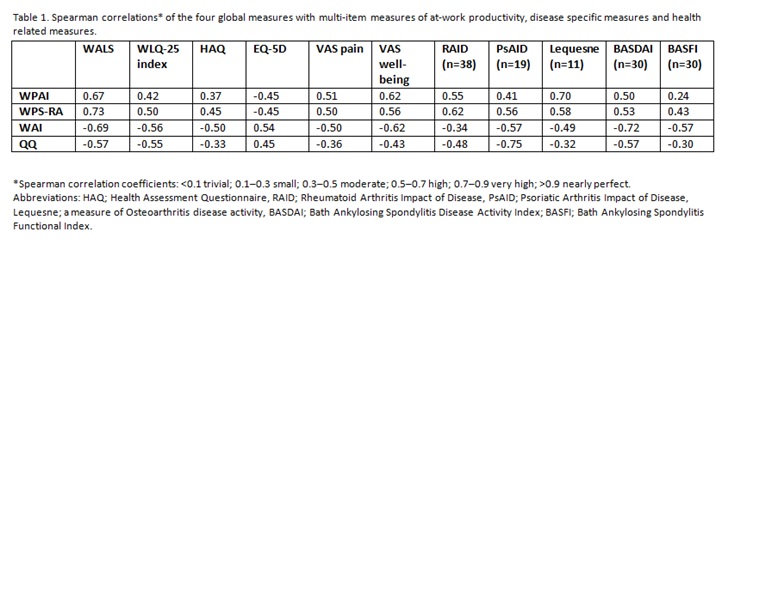Session Information
Session Type: ACR Poster Session C
Session Time: 9:00AM-11:00AM
Background/Purpose:
Several global measures are available to assess at-work
productivity loss in rheumatic diseases. Paucity in research exploring the construct
validity of such measures contributes to a lack of consensus on which measure
is optimum. The purpose of this study was to determine the construct and
convergent validity of four global measures of at-work productivity loss,
namely the Work Productivity Scale–Rheumatoid Arthritis (WPS-RA), Work
Productivity and Activity Impairment Questionnaire (WPAI), Work Ability Index
(WAI), and the Quality and Quantity questionnaire (QQ), with multi-item
measures of at-work productivity and health specific measures.
Methods:
In this international study, 101 patients with inflammatory
arthritis or OA in paid employment were recruited from 3 countries (UK, Canada,
and Romania). Demographic, clinical, and occupational data (e.g., occupation;
manual vs. non-manual) were collected. The global measures of at-work
productivity loss were completed (WPAI; 0=no effect on work – 10=completely
prevented from working, WPS-RA; 0=no interference – 10=complete
interference, WAI; 0=unable to work – 10=work ability at its best, QQ;
0= practically nothing– 10=normal quantity), in addition to multi-item measures of
at-work productivity loss (the Workplace Activity Limitations Questionnaire;
WALS, & the Work Limitations Questionnaire; WLQ-25) and disease specific
and health related outcomes. Spearman’s correlation coefficients were used to
assess the strength of the relationship between the global measures with
multi-item and health related measures.
Results:
59% of the study population were female; mean
age was 48 years (SD 8.8) and the mean symptom duration was 14 years (SD 10.8).
39% of the population had RA, and 52% had a non-manual occupation. Spearman
correlations yielded mostly high (i.e., 0.5-0.7), with some moderate (i.e.
0.3-0.5) convergence between global and multi-item measures (Table 1). Overall, convergence was higher with the
WALS (with the WPS-RA having the highest convergence; 0.73) and lower with the
WLQ-25 (with the WPAI having the lowest convergence; 0.42), likely because of
differences in construct measured by multi-item measures [i.e. degree of
limitation (WALS) vs. amount of time limited (WLQ-25)]. Construct validity
revealed mostly high, with some moderate, correlations between the global
measures and health related questionnaires (Table 1).
Conclusion:
Most of the global measures demonstrated high convergence
validity with multi-item measures and construct validity with disease specific
measures. The strength of the relationships was variable across instruments,
likely due to differences amongst global and multi-item measures (e.g., varying
constructs). Overall, the results contribute to the currently sparse validity
data supporting the use of global instruments to measure at-work productivity
loss.
To cite this abstract in AMA style:
Leggett S, Lacaille D, Mihai C, Bojinca M, van As B, Verstappen SM. Construct and Convergent Validity of Four Global Measures of at-Work Productivity Loss in Patients with Rheumatic Diseases [abstract]. Arthritis Rheumatol. 2015; 67 (suppl 10). https://acrabstracts.org/abstract/construct-and-convergent-validity-of-four-global-measures-of-at-work-productivity-loss-in-patients-with-rheumatic-diseases/. Accessed .« Back to 2015 ACR/ARHP Annual Meeting
ACR Meeting Abstracts - https://acrabstracts.org/abstract/construct-and-convergent-validity-of-four-global-measures-of-at-work-productivity-loss-in-patients-with-rheumatic-diseases/

